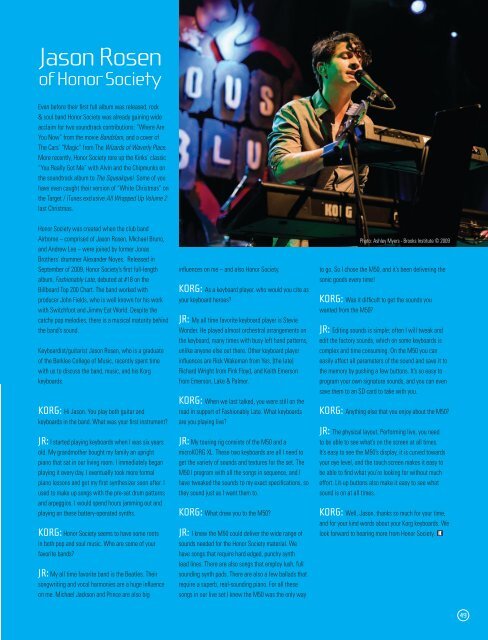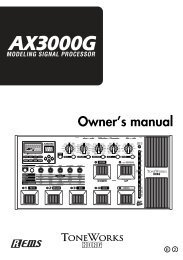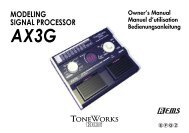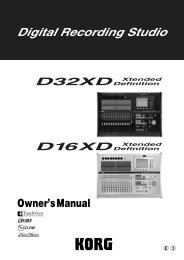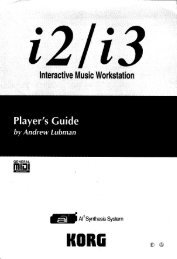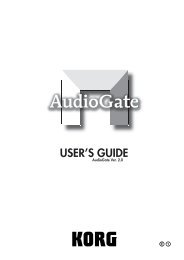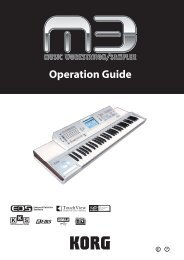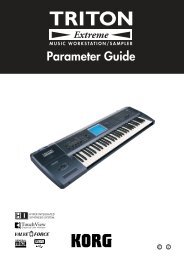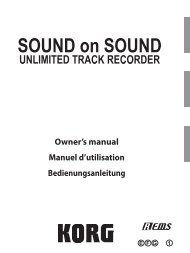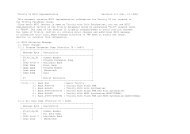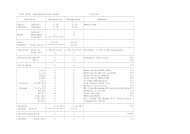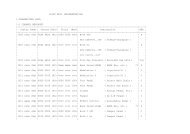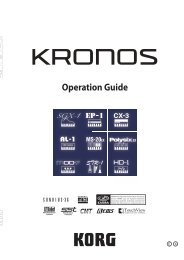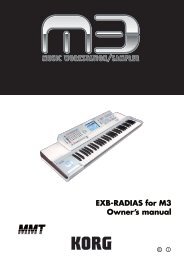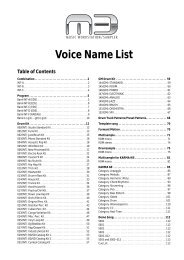Download - Korg
Download - Korg
Download - Korg
You also want an ePaper? Increase the reach of your titles
YUMPU automatically turns print PDFs into web optimized ePapers that Google loves.
Jason Rosen<br />
of Honor Society<br />
Even before their first full album was released, rock<br />
& soul band Honor Society was already gaining wide<br />
acclaim for two soundtrack contributions: “Where Are<br />
You Now” from the movie Bandslam, and a cover of<br />
The Cars’ “Magic” from The Wizards of Waverly Place.<br />
More recently, Honor Society tore up the Kinks’ classic<br />
“You Really Got Me” with Alvin and the Chipmunks on<br />
the soundtrack album to The Squeakquel. Some of you<br />
have even caught their version of “White Christmas” on<br />
the Target / iTunes exclusive All Wrapped Up Volume 2<br />
last Christmas.<br />
Honor Society was created when the club band<br />
Airborne – comprised of Jason Rosen, Michael Bruno,<br />
and Andrew Lee – were joined by former Jonas<br />
Brothers’ drummer Alexander Noyes. Released in<br />
September of 2009, Honor Society’s first full-length<br />
album, Fashionably Late, debuted at #18 on the<br />
Billboard Top 200 Chart. The band worked with<br />
producer John Fields, who is well known for his work<br />
with Switchfoot and Jimmy Eat World. Despite the<br />
catchy pop melodies, there is a musical maturity behind<br />
the band’s sound.<br />
Keyboardist/guitarist Jason Rosen, who is a graduate<br />
of the Berklee College of Music, recently spent time<br />
with us to discuss the band, music, and his <strong>Korg</strong><br />
keyboards.<br />
KORG: Hi Jason. You play both guitar and<br />
keyboards in the band. What was your first instrument?<br />
JR: I started playing keyboards when I was six years<br />
old. My grandmother bought my family an upright<br />
piano that sat in our living room. I immediately began<br />
playing it every day. I eventually took more formal<br />
piano lessons and got my first synthesizer soon after. I<br />
used to make up songs with the pre-set drum patterns<br />
and arpeggios. I would spend hours jamming out and<br />
playing on these battery-operated synths.<br />
KORG: Honor Society seems to have some roots<br />
in both pop and soul music. Who are some of your<br />
favorite bands?<br />
JR: My all time favorite band is the Beatles. Their<br />
songwriting and vocal harmonies are a huge influence<br />
on me. Michael Jackson and Prince are also big<br />
influences on me – and also Honor Society.<br />
KORG: As a keyboard player, who would you cite as<br />
your keyboard heroes?<br />
JR: My all time favorite keyboard player is Stevie<br />
Wonder. He played almost orchestral arrangements on<br />
the keyboard, many times with busy left hand patterns,<br />
unlike anyone else out there. Other keyboard player<br />
influences are Rick Wakeman from Yes, [the late]<br />
Richard Wright from Pink Floyd, and Keith Emerson<br />
from Emerson, Lake & Palmer.<br />
KORG: When we last talked, you were still on the<br />
road in support of Fashionably Late. What keyboards<br />
are you playing live?<br />
JR: My touring rig consists of the M50 and a<br />
microKORG XL. These two keyboards are all I need to<br />
get the variety of sounds and textures for the set. The<br />
M50 I program with all the songs in sequence, and I<br />
have tweaked the sounds to my exact specifications, so<br />
they sound just as I want them to.<br />
KORG: What drew you to the M50?<br />
JR: I knew the M50 could deliver the wide range of<br />
sounds needed for the Honor Society material. We<br />
have songs that require hard edged, punchy synth<br />
lead lines. There are also songs that employ lush, full<br />
sounding synth pads. There are also a few ballads that<br />
require a superb, real-sounding piano. For all these<br />
songs in our live set I knew the M50 was the only way<br />
Photo: Ashley Myers - Brooks Institute © 2009<br />
to go. So I chose the M50, and it’s been delivering the<br />
sonic goods every time!<br />
KORG: Was it difficult to get the sounds you<br />
wanted from the M50?<br />
JR: Editing sounds is simple; often I will tweak and<br />
edit the factory sounds, which on some keyboards is<br />
complex and time consuming. On the M50 you can<br />
easily affect all parameters of the sound and save it to<br />
the memory by pushing a few buttons. It’s so easy to<br />
program your own signature sounds, and you can even<br />
save them to an SD card to take with you.<br />
KORG: Anything else that you enjoy about the M50?<br />
JR: The physical layout. Performing live, you need<br />
to be able to see what’s on the screen at all times.<br />
It’s easy to see the M50’s display, it is curved towards<br />
your eye level, and the touch screen makes it easy to<br />
be able to find what you’re looking for without much<br />
effort. Lit-up buttons also make it easy to see what<br />
sound is on at all times.<br />
KORG: Well, Jason, thanks so much for your time,<br />
and for your kind words about your <strong>Korg</strong> keyboards. We<br />
look forward to hearing more from Honor Society.<br />
49


